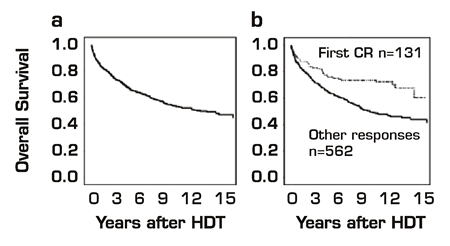Follicular lymphoma (FL) is an indolent non-Hodgkin lymphoma responsive to a variety of chemoimmunotherapeutic approaches. However, the lack of cure with these treatments has led to a number of clinical trials over the past 20 years investigating the role of high-dose therapy (HDT) and autologous stem cell transplantation (ASCT) in first or subsequent remission, with no consensus benefit for overall survival (OS) and with concerns regarding early and late toxicities. Montoto and colleagues report a retrospective analysis and long-term follow-up of 693 patients with FL from the European Blood and Marrow Transplantation Registry who received HDT-ASCT in first remission or after relapse and subsequent treatment. As a registry-based analysis, induction treatments and the type of HDT conditioning regimens varied. Fifty-eight percent received total-body irradiation (TBI) as part of HDT, 81 percent of patients were treated after 1990, and all patients in the analysis had at least five years of follow-up; 30 percent of patients had received only a single line of treatment prior to HDT-ASCT, and 19 percent were in first complete remission (CR1). Half of the patients relapsed following HDT-ASCT at a median of 1.5 years, with lower relapse rates among those patients who received TBI conditioning regimens (53 percent vs. 43 percent; p=.05). Progression-free survival (PFS) and OS were improved for patients transplanted in CR1 (Figures 1a and 1b). Ninety-three patients (13 percent) died within one year of HDT from a cause other than lymphoma, most due to infection, and 40 (6 percent) died of a non-lymphoma cause more than one year post-HDT, most due to second malignancy. The latter was significantly more common in TBI-treated patients and contributed to an inferior long-term survival for TBI versus non-TBI conditioning regimens despite the lower relapse rates.
In Brief
These results support previous findings that HDT-ASCT may result in durable remission and possible cure for a subset of patients with FL. Patients who received a transplant in CR1, and those who had received fewer lines of pre-transplant chemotherapy or were younger than 45 at transplant, had improved outcomes. The analysis also verifies excess late mortality due to second malignancies including MDS/AML, primarily in those treated with TBI; as such, TBI should no longer be utilized in conditioning regimens and has been largely abandoned. Although this is the largest series to date evaluating HDT-ASCT in FL and having the benefit of very long follow-up, caveats include the retrospective and non-randomized nature of this study, the lack of central pathology review, and the varying induction and conditioning regimens utilized. Previous prospective randomized clinical trials of HDT-ASCT for FL in CR1 failed to show a benefit in OS and also showed excess late, second malignancies.1 However, these prospective trials and the current retrospective analysis only included patients treated in the pre-chemoimmunotherapy era. Further prospective clinical trials will be necessary to assess whether HDT-ASCT will evolve to become a reliably curative approach via induction chemoimmunotherapy and "in vivo purging" with monoclonal antibody therapy prior to stem cell collection, or will become extinct if comparably long PFS and OS is achievable with more effective and less toxic induction therapies, consolidative immunotherapy with monoclonal antibodies or idiotype vaccines, or the availability of more effective regimens for patients who relapse.
References
Competing Interests
Dr. Williams indicated no relevant conflicts of interest.

